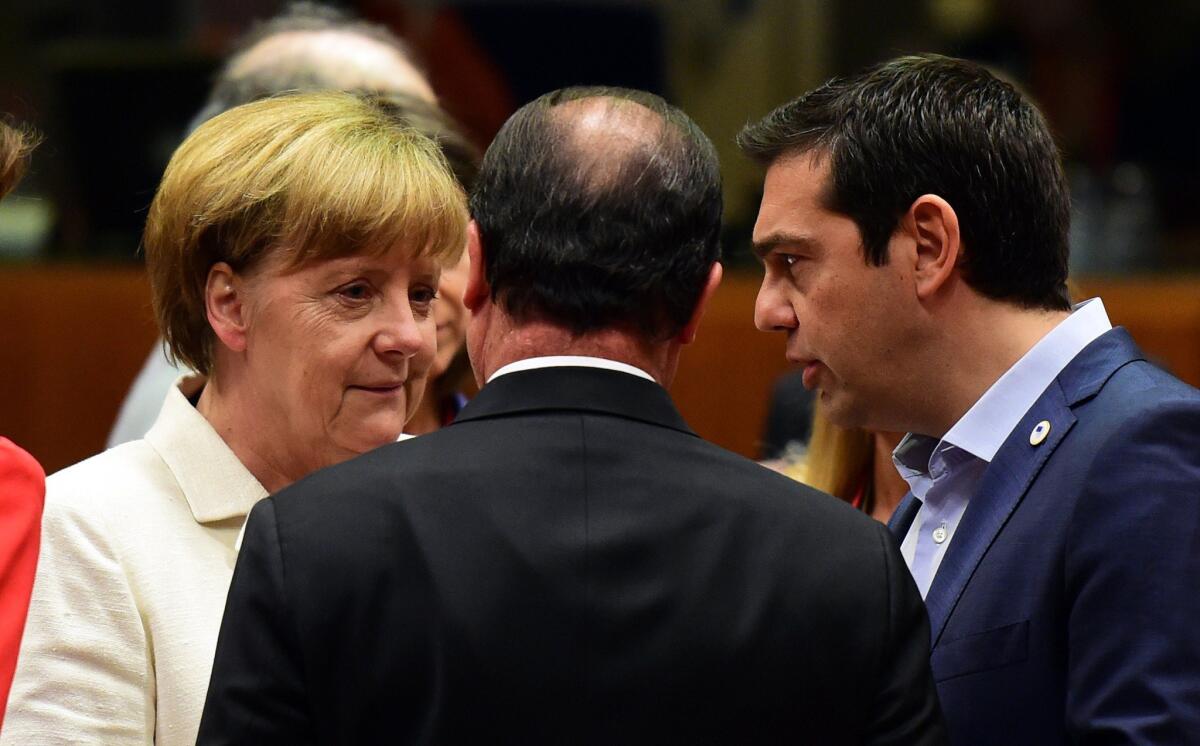Marathon debt talks center on trying to reestablish trust in Greece

German Chancellor Angela Merkel, left, French President Francois Hollande, center, and Greek Prime Minister Alexis Tsipras confer prior to the start of a summit of Eurozone heads of state in Brussels.
- Share via
Reporting from London — Leaders of the 19 nations with the euro as their common currency labored into the early hours of Monday trying to decide whether Greece should remain one of their group or be kicked out in an unprecedented setback to European unity.
Marathon talks that began Sunday afternoon centered on how debt-stricken Athens could reestablish enough trust with its European partners to win emergency loans from them worth billions of dollars. Countries such as Germany were pushing the Greek government to rush through new laws this week to show that Athens was serious in making its economy more competitive.
That show of faith could then set the stage for talks on a full bailout for Greece that would prevent it from tumbling into a messy default and a certain exit from the Eurozone.
The debate over whether to help Greece out of its latest hole has cleaved sharp divisions between Germany and France, the two main drivers of the European Union, as well as among other Eurozone nations.
Skeptics, led by Berlin and mostly from Northern and Eastern European countries, say they do not trust Athens to make the reforms and cuts they are demanding as a condition of lending Greece more money. But other nations such as France and Italy warn that cutting Greece loose from the euro — the most important symbol of deeper integration on the continent — would make a mockery of the European Union.
“France is going to do everything to reach an agreement tonight,” French President Francois Hollande said. “It is Europe that is at stake.”
A leaked draft, obtained by Reuters, of the demands on Athens by its European partners indicated a tough menu of austerity cuts, privatization and pension reforms that go far beyond the proposals submitted for review by the Greek government last week.
Those measures could prove a tough sell for Greek Prime Minister Alexis Tsipras and his left-wing Syriza party, which was elected in January on a pledge to end austerity. But faced with his country’s expulsion from the euro and certain economic collapse, Tsipras has reneged on many of his campaign promises, and his government’s bailout proposals already contain significant concessions.
“We can reach an agreement tonight if all parties want it,” Tsipras said upon arriving in Brussels, adding that he was ready to make compromises.
A full bailout deal Sunday night is extremely unlikely. But Greece and its supporters are hoping to get agreement that the basis for a deal exists and that further negotiations on a rescue package are justified.
That could provide a signal to the European Central Bank to continue propping up Greece’s cash-starved banks. If European leaders conclude instead Sunday that no deal with Athens is possible, the central bank will almost certainly cut its lifeline, and Greece’s banks are likely to collapse within days, if not hours, sparking financial chaos and setting Greece firmly on a path out of the Eurozone.
Tsipras’ biggest challenge is to convince his fellow Eurozone leaders that he is a reliable partner. Many European officials have spoken of a complete loss of trust in Athens because of its negotiating tactics, including a decision late last month to break off talks in favor of holding a public referendum in Greece on austerity. The decision shocked European leaders who thought they were nearing a deal.
Skeptical creditors are demanding proof that Athens will follow through on any commitments it undertakes in a bailout deal. One idea is for the Greek government to rush through new laws reforming the economy this week to show its sincerity, after which its Eurozone partners would agree to continue bailout talks.
“If the Greek government commits to implement and vote now, without delay, [on] strong reforms in the short term, there is the basis for the opening of negotiations” on a bailout, Pierre Moscovici, the European Union’s top economic official, said.
“We need to have finally today an agreement, which is as well ambitious on the economic side but also politically realistic,” said Moscovici, who is French. “What we want is a reformed — deeply reformed — Greece, inside the Eurozone.”
The summit of Eurozone leaders came after marathon negotiations by their finance ministers Saturday to pave the way for an agreement. The talks broke up after nearly 10 hours without an agreed position.
The finance chiefs reconvened Sunday morning for more talks, but the decision now rests with government leaders.
henry.chu@latimes.com
More to Read
Sign up for Essential California
The most important California stories and recommendations in your inbox every morning.
You may occasionally receive promotional content from the Los Angeles Times.














